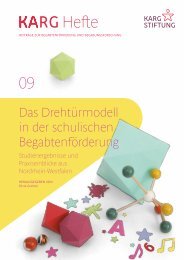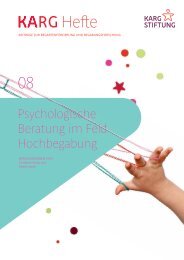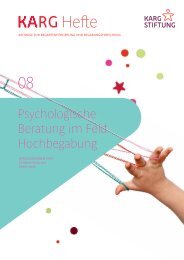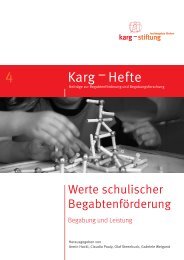FAQS: Frequently asked questions about giftedness
The Karg Foundation receives a lot of questions on the subject of giftedness—FAQs (Frequently Asked Questions)—far more often indeed than it did ten years ago. And this is a good thing! Many people involved in the educational processes of children have come to realize that giftedness can also be a fundamental personality trait of children and adolescents. The Karg Foundation wants to answer the questions you may have not only as educational and psychological professionals in educational institutions or working as educational providers, policy makers, or in training and further education institutes, but as parents and gifted people also: What is giftedness? How can it be identified? Who can provide advise for gifted children and their families? How can they be supported in the best possible way?
The Karg Foundation receives a lot of questions on the subject of giftedness—FAQs (Frequently Asked Questions)—far more often indeed than it did ten years ago. And this is a good thing! Many people involved in the educational processes of children have come to realize that giftedness can also be a fundamental personality trait of children and adolescents.
The Karg Foundation wants to answer the questions you may have not only as educational and psychological professionals in educational institutions or working as educational providers, policy makers, or in training and further education institutes, but as parents and gifted people also: What is giftedness? How can it be identified? Who can provide advise for gifted children and their families? How can they be supported in the best possible way?
Create successful ePaper yourself
Turn your PDF publications into a flip-book with our unique Google optimized e-Paper software.
Schools specializing in gifted<br />
education are an appropriate<br />
option for which gifted<br />
students?<br />
Schools specializing in the education of gifted students<br />
as well as gifted programs at regular schools offer<br />
the most comprehensive educational support: The instruction<br />
provided in these settings is typically both substantially<br />
accelerated and augmented by more in-depth and<br />
broader involvement with school-related topics. As a result,<br />
these schools can respond optimally to the learning needs<br />
of gifted students. They often also offer a range of elective<br />
and after-school programs that provide additional support<br />
opportunities. Whereas some specialized schools or classes<br />
have specific profiles (e.g., music, science), others target<br />
students with broad intellectual abilities.<br />
Prior to admission, students typically undergo an<br />
extensive selection process, which may include achievement<br />
and intelligence testing, so that ultimately only truly<br />
gifted and (potentially) high-achieving children and adolescents<br />
are admitted. It is reasonable to assume that<br />
learning together with other gifted students also has a<br />
positive effect on learning success.<br />
Research has shown that these schools are generally<br />
successful because their students achieve very good learning<br />
outcomes and are usually very satisfied with their<br />
schools. Likewise, the teachers typically enjoy teaching in<br />
specialized schools and classes. However, specialized<br />
schools may not always be an option. Many gifted children<br />
and adolescents are very happy and do well at their regular<br />
school, so there is no need for them to attend a specialized<br />
school. Furthermore, there are relatively few specialized<br />
schools in Germany that are only available in certain locations,<br />
and not everyone can travel long distances to attend<br />
school or wants to transfer to a boarding school in order<br />
to attend a specialized school.<br />
86 87
















